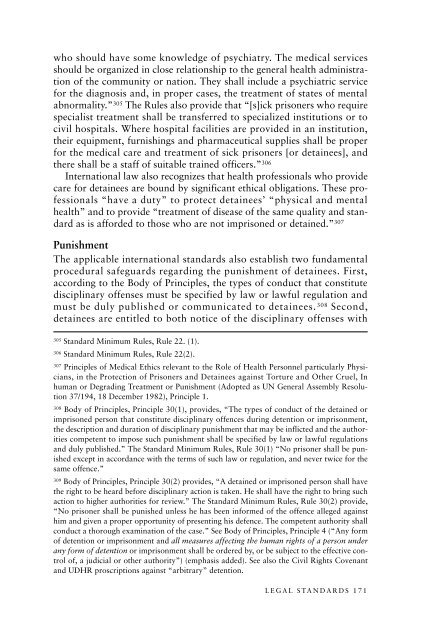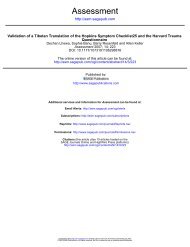From Persecution to Prison - Bellevue/NYU Program for Survivors of ...
From Persecution to Prison - Bellevue/NYU Program for Survivors of ...
From Persecution to Prison - Bellevue/NYU Program for Survivors of ...
Create successful ePaper yourself
Turn your PDF publications into a flip-book with our unique Google optimized e-Paper software.
who should have some knowledge <strong>of</strong> psychiatry. The medical servicesshould be organized in close relationship <strong>to</strong> the general health administration<strong>of</strong> the community or nation. They shall include a psychiatric service<strong>for</strong> the diagnosis and, in proper cases, the treatment <strong>of</strong> states <strong>of</strong> mentalabnormality.” 305 The Rules also provide that “[s]ick prisoners who requirespecialist treatment shall be transferred <strong>to</strong> specialized institutions or <strong>to</strong>civil hospitals. Where hospital facilities are provided in an institution,their equipment, furnishings and pharmaceutical supplies shall be proper<strong>for</strong> the medical care and treatment <strong>of</strong> sick prisoners [or detainees], andthere shall be a staff <strong>of</strong> suitable trained <strong>of</strong>ficers.” 306International law also recognizes that health pr<strong>of</strong>essionals who providecare <strong>for</strong> detainees are bound by significant ethical obligations. These pr<strong>of</strong>essionals“have a duty” <strong>to</strong> protect detainees’ “physical and mentalhealth” and <strong>to</strong> provide “treatment <strong>of</strong> disease <strong>of</strong> the same quality and standardas is af<strong>for</strong>ded <strong>to</strong> those who are not imprisoned or detained.” 307PunishmentThe applicable international standards also establish two fundamentalprocedural safeguards regarding the punishment <strong>of</strong> detainees. First,according <strong>to</strong> the Body <strong>of</strong> Principles, the types <strong>of</strong> conduct that constitutedisciplinary <strong>of</strong>fenses must be specified by law or lawful regulation andmust be duly published or communicated <strong>to</strong> detainees. 308 Second,detainees are entitled <strong>to</strong> both notice <strong>of</strong> the disciplinary <strong>of</strong>fenses with305Standard Minimum Rules, Rule 22. (1).306Standard Minimum Rules, Rule 22(2).307Principles <strong>of</strong> Medical Ethics relevant <strong>to</strong> the Role <strong>of</strong> Health Personnel particularly Physicians,in the Protection <strong>of</strong> <strong>Prison</strong>ers and Detainees against Torture and Other Cruel, Inhuman or Degrading Treatment or Punishment (Adopted as UN General Assembly Resolution37/194, 18 December 1982), Principle 1.308Body <strong>of</strong> Principles, Principle 30(1), provides, “The types <strong>of</strong> conduct <strong>of</strong> the detained orimprisoned person that constitute disciplinary <strong>of</strong>fences during detention or imprisonment,the description and duration <strong>of</strong> disciplinary punishment that may be inflicted and the authoritiescompetent <strong>to</strong> impose such punishment shall be specified by law or lawful regulationsand duly published.” The Standard Minimum Rules, Rule 30(1) “No prisoner shall be punishedexcept in accordance with the terms <strong>of</strong> such law or regulation, and never twice <strong>for</strong> thesame <strong>of</strong>fence.”309Body <strong>of</strong> Principles, Principle 30(2) provides, “A detained or imprisoned person shall havethe right <strong>to</strong> be heard be<strong>for</strong>e disciplinary action is taken. He shall have the right <strong>to</strong> bring suchaction <strong>to</strong> higher authorities <strong>for</strong> review.” The Standard Minimum Rules, Rule 30(2) provide,“No prisoner shall be punished unless he has been in<strong>for</strong>med <strong>of</strong> the <strong>of</strong>fence alleged againsthim and given a proper opportunity <strong>of</strong> presenting his defence. The competent authority shallconduct a thorough examination <strong>of</strong> the case.” See Body <strong>of</strong> Principles, Principle 4 (“Any <strong>for</strong>m<strong>of</strong> detention or imprisonment and all measures affecting the human rights <strong>of</strong> a person underany <strong>for</strong>m <strong>of</strong> detention or imprisonment shall be ordered by, or be subject <strong>to</strong> the effective control<strong>of</strong>, a judicial or other authority”) (emphasis added). See also the Civil Rights Covenantand UDHR proscriptions against “arbitrary” detention.LEGAL STANDARDS 171



